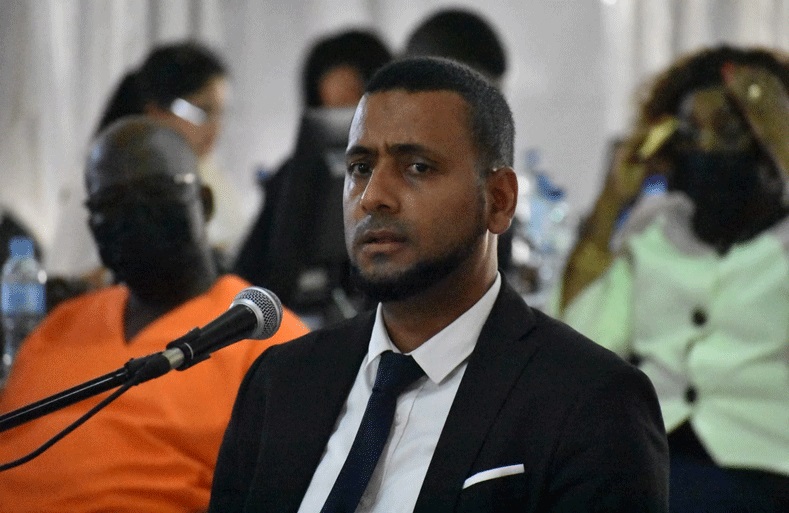Six Mozambicans, two South Africans still in jail as Hawks discover underground drugs labs in ...
Hidden debts trial: Monday, 17 January 2022 | Judge rejects attempt to censor witness – AIM report
Photo: O País
Judge Efigenio Baptista of the Maputo City Court on Monday evening categorically rejected an attempt by defence lawyers, backed by the Mozambican Bar Association (OAM), to scrub from the record of the current “Hidden Debts” trial the testimony given in December by lawyer Imran Issa.
At earlier stages of the trial, Issa had represented several of the 19 accused. Knowing that he was on the list of witnesses, Issa applied to the OAM in late September for authorization to break his duty of confidentiality to his clients. The following day, the OAM granted him that authorization.
Back in early December, Baptista stressed that Issa had acted within the law, and if the defence lawyers did not know this, it merely showed that they did not consult documents relevant to the trial that arrived regularly at his registry office. (Like the courtroom itself, the judge’s office has been improvised on the premises of the Maputo top security prison).
But the attacks on Issa have continued. The latest argument is that the OAM had only authorized Issa to speak about the affairs of two of his clients, the business people Zulfikar Ali and Fabiao Mabunda. But he had also spoken about others whom he had once represented, notably Antonio Carlos do Rosario, the former head of economic intelligence in the country’s security service, SISE.
It is hardly surprising that Rosario and his legal team should want to quash Issa’s testimony: Issa had said on 7 December that he was both a collaborator with SISE (recruited by Antonio do Rosario), and a lawyer who dealt with all the legal affairs of the various companies established by Rosario, and which the prosecution believes are part of a complex money laundering scheme run by the Abu Dhbabi based group Privinvest and its SISE accomplices.
Issa refused to give any details about his SISE activities, but he made clear that every significant decision concerning the companies was taken by Rosario and that boards of directors and shareholder meetings were mere decoration.
Rosario also used him as a spy. When the Attorney-General’s Office (PGR) accused Fabiao Mabunda of money laundering and other crimes linked to the “hidden debts” in late 2018, Rosario told Issa to accompany Mabunda to his interrogation at the PGR offices and report back. He did so at a meeting held in a Maputo restaurant with Rosario, his boss, the then general director of SISE, Gregorio Leao, and the latter’s wife Angela. This meeting could be used as evidence of the criminal conspiracy that is one of charges against most of the accused.
Issa said he met with Mabunda several times, and during these meetings Mabunda revealed details of the money received from Privinvest, which amounted to about 9.1 million dollars. His building company MMocambique Construcoes had signed two contracts with Logistics International, part of the Privinvest group.
The building work to be done by Mabunda’s company with this money never happened, and Mabunda had never set eyes on the Privinvest official he named as Fauzi (believed to be Mohamed Fauzi) who signed the contracts in the name of Logistics International. Mabunda told Issa he received the contracts only so that he could show them to his bank as justification for receiving millions of dollars.
Mabunda said that the money really belonged to Angela Leao. “He said he’d never had any contact with Privinvest, and he’d never done any work for that group”, recalled Issa.
The defence lawyers realized how damaging this testimony was and demanded that it be struck from the record on the grounds that Issa had exceeded the terms of the authorisation granted by the OAM.
But Baptista read out the request that Imran had sent to the OAM and which the OAM had granted in full. The request did not mention any names at all – instead it spoke of “all” the clients whom Issa had represented. By approving this request, the OAM had allowed Issa to speak about the affairs of Rosario and his companies.
The outcry that followed intimidated the OAM leadership, which withdrew the authorisation that had allowed Issa to breach the lawyer-client duty of confidentiality. But it was far too late, and the OAM made matters worse for itself by attempting a piece of retroactive censorship.
Baptista was not amused. He accused the OAM of bowing to pressure from several of the defence lawyers, naming in particular Isalcio Mahanjane, Abdul Gani and Alice Mabota. Mahanjane is Rosario’s lawyer, while Gani represents Gregorio Leao.
In December, Mabota protested that she had been practicing law since 1973, and she had never seen anything like Issa’s testimony. “Just because you’ve been doing things the same way for the past 50 years doesn’t make it right,” retorted Baptista.

The judge also accused the OAM of trying to gag one of its own members. It wanted to eliminate Issa’s testimony, not only about his own clients, but about people whom he had never represented such as Gregorio Leao, former President Armando Guebuza and his oldest son, Ndambi. In these cases there could be no question of any violation of confidentiality. Furthermore, it had been a representative of the OAM who asked Issa about the Guebuza family – so how could the OAM now protest that he had answered them?
The OAM’s attitude towards Issa was “unjust and ugly”, Baptista said. It was trying to prevent Issa from complying with his duty to tell the truth. It was prioritising its conception of the “dignity” of the legal profession above the need to uncover the truth “in a case where the Mozambican state was damaged to the tune of over two billon dollars”.
The judge warned that the OAM was coming into conflict with its duty in the trial to assist the Public Prosecutor. That is the sole reason why OAM representatives are present at the trial and can question the accused and the witnesses.












Leave a Reply
Be the First to Comment!
You must be logged in to post a comment.
You must be logged in to post a comment.